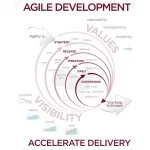Six Tips for Interviewing Scrum Masters, Part 2
Now that you know what you expect from your Scrum Master’s job (the deliverables), and you know the essential and desirable skills (the first three tips), you can focus on creating the interview questions and audition. (If you have not yet read Six Tips for Interviewing Scrum Masters, Part 1 for the first three tips, please do so now.)
Tip 4: Create Behavior-Description Questions for Your Scrum Master Based on Essential Qualities, Preferences, and Non-Technical Skills
For initiative, you might ask behavior-description questions like these:
- Give me an example of a recent time you thought the team was stuck. How did you know the team was stuck and what did you do? (You want to know if the SM was command-and-control, interfering or helpful.)
- Tell me about a time when your Product Owner was convinced the story was as small as possible, but the story was a month long. Have you encountered something like this? (Maybe a month is longer than what the candidate encountered. Maybe it wasn’t the PO. Listen to their experience.) What happened? (Listen for what the SM did or did not do. Different Scrum Masters facilitate differently. There Is No Right Answer.)
- Tell me about a recent time the team had many stories in progress and didn’t finish at the end of a sprint. What happened? (Listen for what the SM did or did not do. Different Scrum Masters facilitate differently. There Is No Right Answer.)
For flexibility, consider these questions:
- What do you consider negotiable in a Scrum team? Why? Give me a recent example of that flexibility.
- Give me an example of a time you and the team were stymied by something. What happened?
- Have you ever needed to compromise as a Scrum Master? Tell me about it.
Again, you have to listen for the context and what the Scrum Master did in the different context for the project and the organization. There is no right answer. There are answers that don’t fit your context. Make sure you keep reading down to see my question about learning from past experiences.
For perseverance, you might like these questions:
- Tell me about a time you advocated for something you wanted.
- Tell me about a work obstacle you had to overcome.
- Tell me about a time you had to maintain focus when it seemed everyone else was losing their focus.
Do you see the pattern? Apply behavior-description questions to your essential qualities, preferences and non-technical skills.
Tip 5: Create at Least One Audition Based on Deliverables
Back in Six Tips for Interviewing Scrum Masters, Part 1, I said that you needed to define deliverables. I suggested a potential list of 10 deliverables. You might have these candidate auditions:
- Facilitate a standup
- Facilitate a retrospective
- Look at a Scrum board and tell you what it means
- Look at a team’s measurements and tell you what they mean
I’m not saying these are the best auditions, because I don’t know what you need Your Scrum Master to do. These are candidate auditions. I have a lot more about how to create auditions in Hiring Geeks That Fit.
Tip 6: Ignore Certifications and Look for the Growth Mindset
I have never been a fan of certifications. If I have to choose between a candidate with a certification and a candidate with a growth mindset, I’ll select the candidate with the growth mindset. (Remember, you can buy a certification by taking a class. That’s it.) Certifications are good for learning. They are not good for helping people prove they have executed anything successfully.
When you interview for the growth mindset, you ask behavior-description questions. When they answer in a way that intrigues you, you ask, “What did you learn from that?” (a reflective hypothetical question). Then ask, “How have you put that learning into practice?” (a behavior-description question). Now, you have yourself a terrific conversation, which is the basis for a great interview.
Okay, there are my six tips for hiring a Scrum Master. If you want to understand how to hire without fear, read Hiring Geeks That Fit.
| Reference: | Six Tips for Interviewing Scrum Masters, Part 2 from our JCG partner Johanna Rothman at the Managing Product Development blog. |


